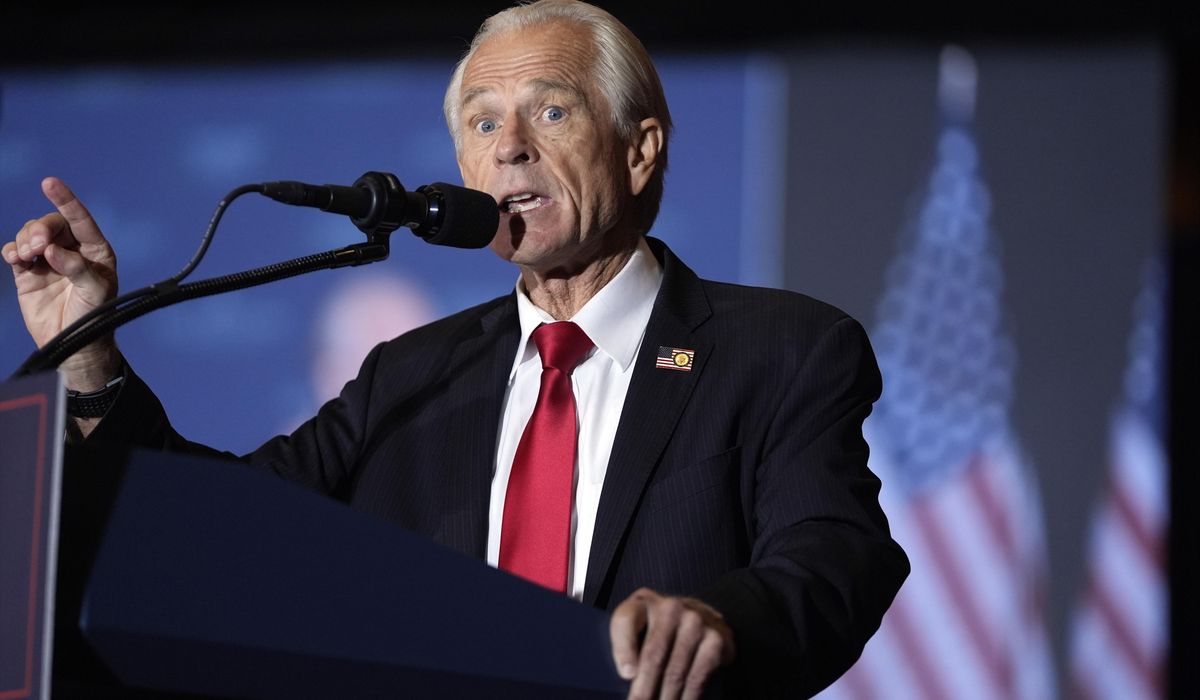


Peter Navarro, a senior trade aide to President Trump, on Tuesday said the rise of drug cartels in Canada played into the administration’s threat to slap tariffs on America’s neighbor to the north.
Mr. Navarro said the administration’s reliance on tariffs should be seen through the lens of a “drug war — not a trade war.”
“The problem is, first of all, that Mexican drug cartels are rapidly expanding in Canada,” Mr. Navarro said at a Politico forum before raising concerns about lone wolf terrorists.
“We are in a situation now where almost a hundred people have come in through Canada on the terrorist watch list alone,” he said. “It only takes one to blow something up here.”
Mr. Trump has put a 30-day pause on his plans to slap 25% tariffs on Canada and Mexico after the nations agreed to boost border security.
Still, the tariff threat triggered criticism from Democrats and free-market economists. They warned the move would spark a trade war that would hurt American families, forcing them to pay more for groceries, gas and other goods.
Others questioned why Mr. Trump was lumping Canada in with Mexico on the issue of immigration when the vast majority of illegal immigrants and illicit drugs are coming in across the southern border.
In his tariff action, Mr. Trump addressed the issue.
“The challenges at our southern border are foremost in the public consciousness, but our northern border is not exempt from these issues,” Saturday’s presidential action reads. “Criminal networks are implicated in human trafficking and smuggling operations, enabling unvetted illegal migration across our northern border. There is also a growing presence of Mexican cartels operating fentanyl and nitazene synthesis labs in Canada.”
Indeed, the Criminal Intelligence Service Canada recently reported the number of organized crime groups producing illicit drugs, including fentanyl, has almost doubled over the past year.
“In more recent years, trafficking networks have increased the production of fentanyl and other synthetic opioids as well as their distribution both domestically and internationally from North America, including Canada, the United States and Mexico,” the report said. “The increase in supply and demand for fentanyl and other synthetic opioids in North America has been facilitated by the growing involvement of organized crime groups.”
Mr. Navarro said the media has failed to explain that the administration’s immediate focus has been on the 75,000 Americans dying every year from fentanyl that originates as precursor chemicals in China and processed by the Mexican drug cartels “both in Mexico and Canada.”
“What is happening is you see the president fighting a drug war — not a trade war,” he said. “What we have seen is a lot of pearl-clutching when this was announced, but what we have also seen is immediate results from Mexico and Canada.”
Mr. Navarro added that Mr. Trump plans to use tariffs to shift the American economy from being “overreliant on income taxes and the Internal Revenue Service to one that is also reliant on tariff revenues and the External Revenue Service.”
He said tariffs would also provide the revenue needed to implement Mr. Trump’s plan to stop taxing restaurant tips.
“When [Mr. Trump] does stuff, it looks like things are a little chaotic,” he said. “It is not. It is genius, and he delivers.”
• Seth McLaughlin can be reached at smclaughlin@washingtontimes.com.
